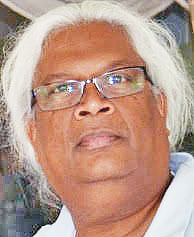Opinions
Incompetence

Was Trump’s government not the one that satisfied the premise that all things, like humans, eventually reach their level
of incompetence, or final placement? Part of this may be due to the accumulation of half-baked minds, over many years, as many fearful and incompetent school principals passed poor students to avoid admitting to failures, and earn themselves and their schools a bad name. Thus, they have created a state of continuing decline in standards of learning by allowing graduation from their schools at steadily lower levels of achievement, so that today’s grade 12 is at best grade 8 or 9 of half a century ago. One sign of this is reading or simple spelling. Reading challenges for a grade 9 class in 1940 included complex writing such as the poetry of Milton, Shakespeare and Wordsworth, and the prose of Charles Lamb; today there are few poets, and less poetry, unless you call the drivel in popular songs poetry, barring some refreshing exceptions.
Reading was drilled in school then; one system used a book series called The Royal Readers, each book consisting of a collection of memorable passages from novels, non-fiction writings (history, geography, news, speeches, poems), at an appropriate level of age-related difficulty. Succeeding volumes included incrementally more challenging text, taking the student from Book I to VI by grade 8, at which level, the competent student could recite any passage you cared to give, whether Dr Seuss or Salman Rushdie, several from memory.
It would be a miracle and a great comfort if the average Grade 8 today could recite, verbatim from memory, some of what he had learned, not counting pop songs and rap, or a grade 12 reproduce a few lines from John Milton or Derek Walcott, or their local equivalent, if (s)he has even heard of them.
So to this question: is the world ruled by sly men exploiting us, or by monumental dullards who really believe that what they do is right and best?
You be the judge.
Trump’s tweets are now legendary. If it were not for the position he holds, POTUS, which gives importance to his words, most would be discarded as junk mail. While it was politically okay for him to ignore Cuba and even accuse it of sonic attacks on Americans in Cuba, it is not okay, politically or morally, to chastise the hurricane victims of Puerto Rico, an American country, already bankrupt and under a Washington control board, and losing skilled people en masse. It is naive to assert that his administration was doing a “fantastic job”, when victims report differently.
How can one escape feeling that this is just another Bush-type error? His Acting Homeland Security head didn’t do much better, in calling the federal response “a good news story”; maybe good for her, but the San Juan mayor, Carmen Cruz, countered, “this is a people-dying story.” But Puerto Ricans are mainly Hispanics, mixed (mestizos) and black, Democrats, not like Texans and Floridians. They were screwed long ago when Congress cancelled their preferential business tax status, and NAFTA started, luring investors to Mexico. Puerto Rico incurred huge debts and its infrastructure deteriorated.
Instead of gloating over their destruction and berating the disadvantaged, Trump could give them real relief by forgiving their debt, and help them rebuild to Category 5 standards, burying their distribution wires like Weston, Florida.
And since he wishes lowering tax for US business, he should restore the island’s tax-exempt status for new businesses, as before. Remember that they live by American laws; those include pay scales, which have driven American jobs to China, and elsewhere. They’ll never come back, unless America subdues the world. Not likely.
As did North Korea, Iran replied to Trump’s UN rant by firing a 2000km missile that could carry multiple warheads. Trump should pause and take a hard look at the world, and maybe copy some of the things Cuba does, and listen to the poor of the world, and not harry athletes or antagonise people whenever he opens his mouth, as in Arizona, or twits a tweet. This is no time for mean-spiritedness or pique
Remembrance of alternate times past
 Romeo Kaseram
Romeo Kaseram
We created alternative ways among ourselves to mark the passage of time, writing back as it were with our own, home-made method running beneath the lateral world imposed from outside in what we heard daily, when the BBC news broadcast out of London, England, with the distant, crackling voice on the radio, accented and British, informing us the world was standardised, universal, and quite a distant and foreign place from our own shores, the man’s monotone on the airwaves spitting out the time of day in our part of the world and then qualifying it, fixing this as a defined point
in space as, “Greenwich Mean Time”, before dryly reading the world news across an ocean of static, which did not mean much to us in any significant, life-changing way. Such was reinforcement of the structure we were being taught making up the bigger and outside world beyond as we were growing up back home, this being the evidence what we were being taught at school should be applied to the real world to shape our future and yet-to-be-lived lives, where to demonstrate how to tell time our teacher made a model of a clock, roughly cutting it out as a circle from a stiff, brown corrugated cardboard box with its inside base imprinted with perfectly pressed circularity from neatly-arranged bottoms of cans of imported condensed milk, the hours of the day hand-written just inside the circumference, and two arrows, these again rough cut-outs, pinned to the centre of the circle with a head-pin bent behind at 90 degrees, this “borrowed” with a more-than-friendly masculine wink by our teacher from the Home Economics lady as he carefully removed it from the bristles of the pin-cushion sitting on her desk.
How the teacher taught us to tell time was him quickly and manually turning the minute and the hour hand-arrows so a rhythm grew into the chorus of our little voices mindlessly chanting, “One o’clock, two o’clock, three o’clock”, what was not taught being the harder, harsher lesson we would later learn in how inexorable and unstoppable time is as it races ahead, mocking us as we age rapidly, the session ending with us shouting at the top of our mismatched, youthful voices in hilarious and gleeful rendition, “Hickory, dickory, dock! The mouse ran up the clock!”, the nursery rhyme itself an import from a time immemorial into our landscape of adobe huts with its makeshift frames of branches cut from trees, our roofs thatched with leaves from the carat palm, this rhyme brought across the seas where mice visited the sturdy forms of British houses to chew through the lard-coated strings holding up lead weights, part of the mechanism that came crashing down to the cacophony of thunderous chiming inside stately, foreign-made, white-faced grandfather clocks.
We had no grandfather clocks, neither in our houses nor our schools, while being taught to tell the time in a hot, humid classroom ventilated to the roof with BRC wire, as we sat on the long, rough-splintered and low benches in a primary school where red-jacketed wasps at times buzzed angrily in nests gummed under the outside ceiling. None of us had a silver wristwatch matching the large, round and pleasant face of our headmaster, and to tell time in the classroom was to consult a two-faced wind-up clock solidly crowned with cumbersome and out-of-tune alarm bells, its hands daily failing to keep up with the steady pace set by Greenwich’s perfect, unrelenting time-pieces in a distant land way, way across the restless Caribbean Sea, and then even further off measured in weeks on a ship ploughing ahead to the White Cliffs on the steady beat of advancing waves that was the cold and unending Atlantic.
We found a way to tell our own time, though. With our own hands we came to determine variations in the wet and dry seasons, these subdivided into the ripening of our tropical fruits. We had the best of times in the “mango season”, when the branches hung down with being over-laden, its hundreds of fruits shifting with the day and night from the darkest green to hints of red, and then, finally, the flaming ripeness in fiery-yellow like hot sunshine, as if an artist was at work with a brush shaped in the mouth so its fine bristles retained a delicate point at its tip. We had “sour cherry season”, and “sapodilla season”; and there was even a “cricket season”, when the long, dry days ended with its gold dust scattered by the velocity of a cork ball leaving the centre of the cricket bat shaped from bois canot wood, the sound sharp and dry as if flung out from the surface of a drum.
We had the worst of times though, during “crop season”, when the sugar-canes were fired for reaping, a foretaste of the apocalypse as the flames soared for hundreds of feet. White snow fell in faraway Greenwich zones; but in our world it was an endless snowfall of black soot whenever time stopped for the cane fires to reduce our homelands to ash.
